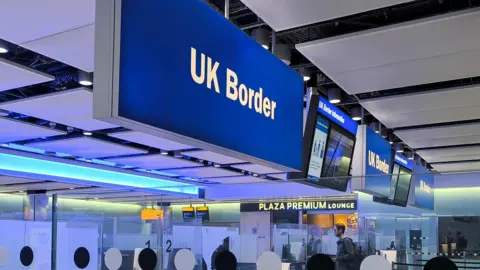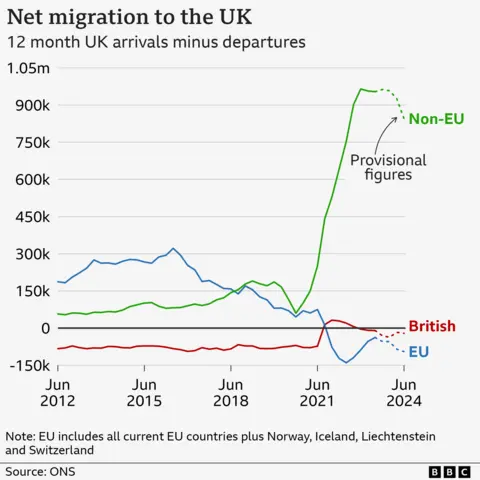Labour's immigration plans at a glance
 NurPhoto via Getty Images
NurPhoto via Getty ImagesSir Keir Starmer has unveiled Labour's long-awaited plans to cut levels of immigration into the UK.
The prime minister said measures in the white paper, a blueprint for future laws, would make the system "controlled, selective and fair".
Here is a summary of the key measures.
Work visas tightened - for some
Overseas workers will now generally need a degree-level qualification to apply for the main skilled worker visa, instead of the equivalent of A-level, reversing a change made under Boris Johnson's government.
This higher threshold will not apply to those already in the UK renewing their visa - but ministers say it will prevent new visa applications for around 180 jobs, reducing immigration by around 39,000 a year by 2029.
Lower qualification requirements will remain on a "time limited basis" for sectors deemed to be facing long-term recruitment issues.
What this means in practice is not yet clear, with the government's migration advisory body tasked with recommending roles for inclusion.
Lower-qualification visas will be capped and restricted to employers with a workforce training plan in place, whilst those applying will also face extra restrictions on bringing their dependants to the UK.
But loosened for others
At the same time, the government wants to expand eligibility for its dedicated work visa for graduates of elite universities outside the UK.
It says a "targeted and capped" expansion of the scheme could see the number of qualifying institutions double, from around 40 currently.
The visa for international students who plan to set up a business in the UK will also be reviewed, and ministers say they want to make it easier for "top scientific and design talent" to apply for the global talent visa.
Longer residency waits
Immigrants will typically have to live in the UK for 10 years before applying for the right to stay indefinitely – double the current five-year period.
Under the plans, this period could be reduced through a new "earned settlement" system, under which people would be awarded points to reflect their contribution to the UK "economy and society".
It is not yet clear when this longer qualifying period will kick in - details of the new system, along with a similar scheme that will apply to applications for citizenship, will be consulted on later this year.
Care visa scrapped
A dedicated visa for social care workers introduced during the Covid pandemic will close to new applicants next month.
Ministers say the visa, which was tightened last year, was a key driver of increased immigration in the years after Brexit, and better pay in the sector can solve longstanding recruitment problems.
Visa extensions will be permitted until 2028, and those who already have working rights will be able to switch sponsor during the term of their visa.

Stricter student rules
Overseas graduates will only be able to stay in the UK for 18 months after their studies, instead of two years currently.
Ministers are also thinking of charging English universities a new 6% tax on tuition fee income from international students, which they are promising to reinvest into the higher education and skills system.
The government says it expects this to be passed on to international students in the form of higher fees, reducing applications by 7,000 per year.
Refugee pilot extended
A "limited pool" of people who lack refugee status in the UK but have been recognised as refugees by the United Nations will be allowed to use existing sponsored worker routes to come to the UK to work.
Ministers say this will build on a three-year EU-sponsored pilot project that saw around 100 skilled refugees and their families allowed to work in specified sectors such as IT, construction and engineering.
Tougher English tests
Language requirements for all work visas will increase, whilst adult dependents of visa-holders will be required to demonstrate a basic understanding of English to come on a spousal and partner route.
The government says those extending visas will be required to demonstrate a higher level of English when applying to settle in the UK.
Skills and training
The government says firms in sectors deemed to rely too much on overseas workers will be "expected to comply" with strategies to boost workplace skills.
These will also be determined by official migration advisers, but government sources say IT, construction and healthcare are likely to feature.
Labour has previously indicated it wants to link skills training to the visa system - but details of what this means in practice have not yet been set out.
Family rights reviewed
The government says it will table legislation to "clarify" how the right to a family life in European human rights law should apply to immigration cases.
It also says Parliament will be able to adopt a "framework" aiming to limit the extent to which family rights can be used to delay the removal of people without the right to stay in the UK.
No overall cap
The prime minister said the government wants to "significantly" reduce net migration - the number of people coming to the UK minus those leaving - from the record levels it has reached in recent years.
But the prime minister is not putting a number on the overall level of net migration he wants to see – saying this approach has consistently failed in the past.
Opposition parties have also declined to specify exactly what levels of migration they want to see each year.
The Conservatives now say they would allow MPs to decide annual caps each year through a vote in Parliament.

Sign up for our Politics Essential newsletter to keep up with the inner workings of Westminster and beyond.
